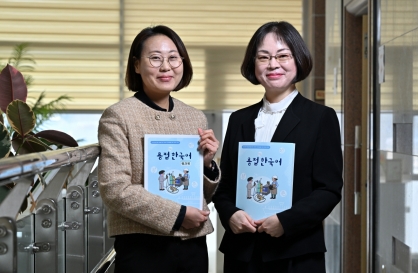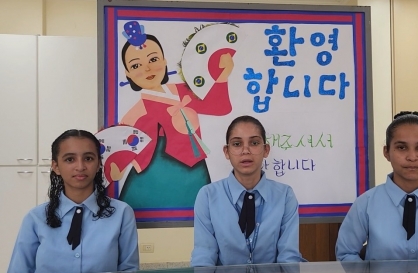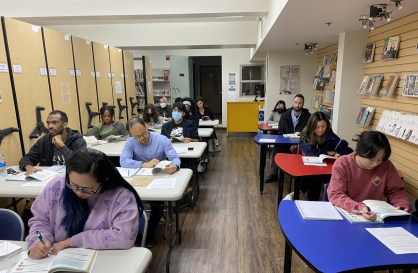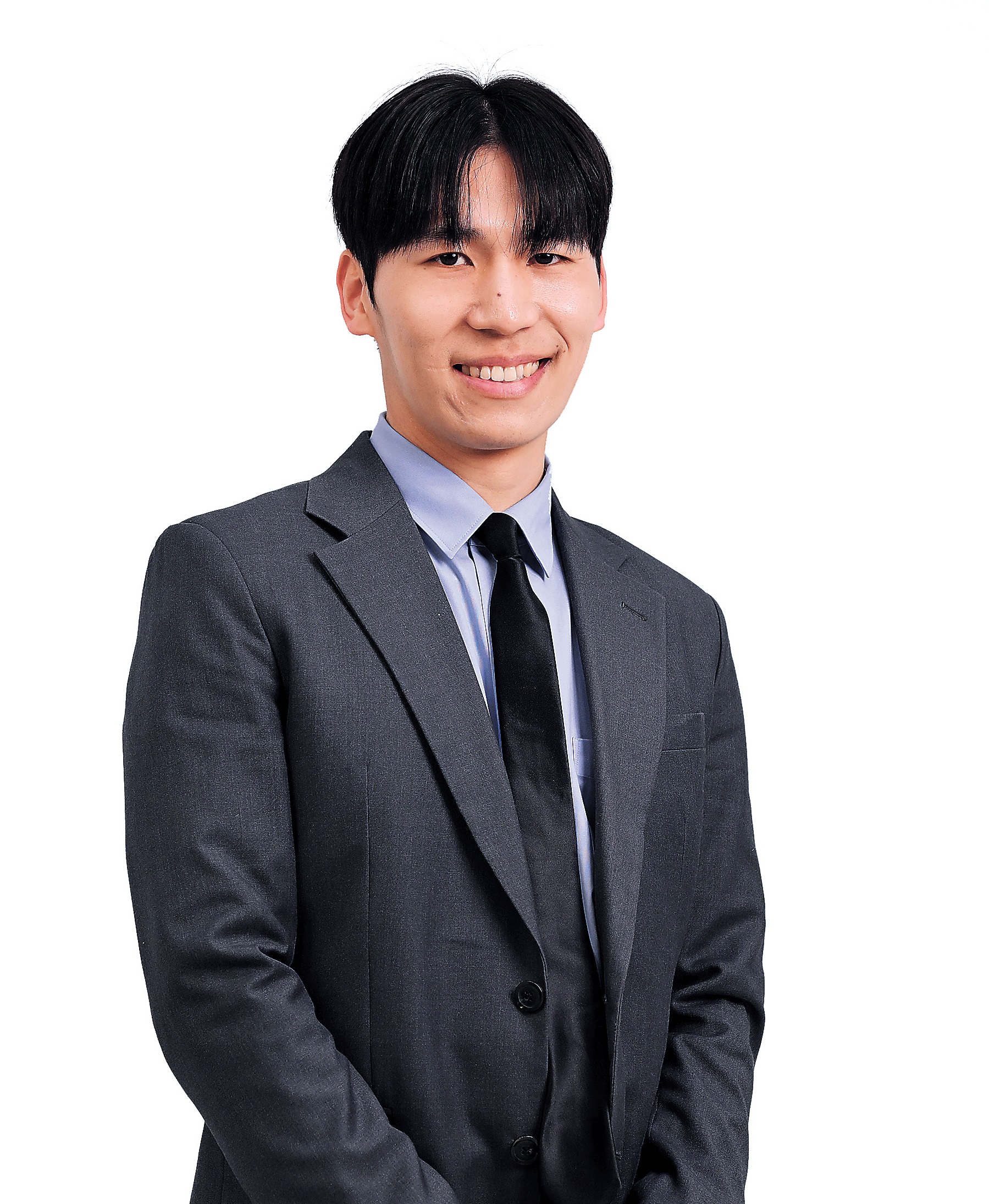Most Popular
Hello Hangeul
-
1
Welding book first in vocational Korean series for foreign labor

-
2
[Korea Beyond Korea] In Sao Paulo, horizons expand for Korean studies
![[Korea Beyond Korea] In Sao Paulo, horizons expand for Korean studies](//res.heraldm.com/phpwas/restmb_idxmake.php?idx=644&simg=/content/image/2023/11/20/20231120000619_0.jpg&u=20231206104853)
-
3
In Brasilia, worldly dreams are born from Korean classes

-
4
Americans seeking to visit Korea learn the language in LA

-
5
[Korea Beyond Korea] Berlin, Europe's Korean Studies hub, nurtures next-gen experts, scholars
![[Korea Beyond Korea] Berlin, Europe's Korean Studies hub, nurtures next-gen experts, scholars](//res.heraldm.com/phpwas/restmb_idxmake.php?idx=644&simg=/content/image/2023/10/18/20231018000929_0.jpg&u=20231023154735)
[Hello Hangeul] Welding book first in vocational Korean series for foreign labor
Professors committed to enhancing communication with migrant workers at workplaces across various industries
By No Kyung-min
Published : Nov. 27, 2023 - 08:39

A plethora of textbooks and learning materials cater to Korean language learners from diverse backgrounds. But, there’s a significant gap for a particular type of learners whose grasp of work-related Korean is crucial not only for quality control and skills development but also for their own safety.
In August, a groundbreaking work was released to fill the void of job-related technical books for non-Korean native speakers in welding. Welding, essential for various manufacturing processes such as shipbuilding, is among a number of labor-intensive jobs that Koreans are less inclined to take up.
“Vocational Korean for Welding” is the result of collaborative efforts led by professor Son Hye-jin from the Department of Global Convergence Welfare, and professor Lee Mi-sun from the Hotel Aviation Tourism division at Seojeong University in Yangju City, Gyeonggi Province, a vocational training university with over 3,000 international students.
Professors Son and Lee serve as director and vice director respectively at the university’s Korean Language for Specific Purposes Research Center. Its aim is to bolster Korean language education and research in specific vocational and academic contexts for foreign nationals.
Their decision to craft an informative guide stems from recognizing the significance of fostering a conducive work environment for migrant workers grappling with the Korean language.
Yet, the effort was not to be concluded as a one-time project, they said. It rather heralded the beginning of a series of Korean books designed to provide practical, linguistic assistance for foreign nationals in the workplace.
Pioneering work
Prior to the issuance of the welding guide, there had been a Korean language textbook tailored for international students in the tourism industry.
"However, the welding guide is the first book specifically designed for Korean language use in field work," Son explained in an interview with The Korea Herald. "We were prompted by requests from shipyard managers who were witnessing the linguistic struggles of their foreign national workers with specific terms and the processes of welding."
Driven by the pressing need for enhanced communication and work efficiency in shipyards, the professors embarked on an unprecedented project to develop a comprehensive Korean language guide.
However, the process of creating this book was a taxing and time-consuming endeavor, as it required meticulous research and the compilation of complex and detailed field-centric information.
“The book took almost two years to complete,” said Lee, who was mostly in charge of writing the book. The whole process encompassed planning, writing, illustration and editorial oversight.
“Illustration was particularly time-consuming as every piece of equipment and action had to be depicted with the utmost precision,” Lee elaborated. Moreover, given the book's specialized content, editorial supervision, which was handled by a Korean language institute professor, proved to be a demanding task, she added.
Comprising 15 chapters dedicated to welding techniques and five chapters focused on workplace safety, the welding book provides a comprehensive curriculum enriched with image-based learning. The book also comes with a workbook for self-assessment and testing knowledge.


Son and Lee's unwavering dedication eventually bore fruit, as the welding guide was met with enthusiastic acclaim from foreign national students. They lauded the guide's practical, situation-centric approach, emphasizing its effectiveness in enhancing their understanding of work processes and technical jargon.
Furthermore, the publication of this pioneering book has paved the way for similar Korean language books tailored to certain fields, they explained.
“Another book is already in the works,” Lee said. The book, scheduled to be released this year, is about painting work at shipyards.
“We are also planning to develop a beauty care book for international students expected to visit our university,” Son said.
Highlighting their commitment to expanding the range of work-related Korean language books, both professors said that Seojeong University plans to publish a series of vocational Korean language textbooks made for particular job roles in various industries, including the automotive industry, tourism and social welfare.
Future workforce
In South Korea, workers of foreign nationals have become an indispensable component of the labor force in industries like shipbuilding and caregiving.
With Korean companies increasingly tapping into an overseas talent pool, it is equally crucial to invest in the linguistic development of foreign laborers to address the nation's domestic workforce shortages in specific sectors.
“The influx of workers of foreign nationals will be crucial for South Korea in face of a demographic crisis as a result of a declining birth rate and an aging population," Son stated. “Given that effective communication is paramount for caregiving, a relevant Korean language book is much needed.”

In addressing such issues, Lee’s concern for the future workforce lies in extending the stays of foreign workers and helping them secure stable jobs.
“There are cases where foreign nationals go back to their home nations, or other countries for work after a few years of working in South Korea,” Lee remarked. “We’d love to help them acquaint themselves with the necessary working knowledge and techniques in the Korean language to secure jobs and attain visas that allow them to bring in their family to our country.”

In a similar fashion, Son also brought to the fore the significance of developing the skills of individual workers from other nations.
“Without proper language proficiency, they may be assigned to simple, repetitive tasks,” Son explained, adding that acquiring the Korean language can open doors to further career advancement opportunities.
“Furthermore, with advanced levels of Korean language skills, they can not only secure quality employment, but also integrate easily into Korean society and contribute as valued members (of society),” Son stated.
As part of efforts to address the need for introducing the language center and developing specialized Korean language educational resources worldwide, the university hosted its inaugural forum focused on the Korean language for specific purposes on Nov. 17, featuring speakers from institutions ranging from Daegu City to Nepal and Bangladesh.
Underscoring the imperative for ongoing research on workplace-oriented Korean language education, Professors Son and Lee expressed their aspirations to collaborate with other institutions and further the advancement of this research domain.
"The center intends to expand its reach and invite more institutions involved in Korean language education to participate next year," Lee said.





![[More than APT] Why apartment complexes flourish in Korea](http://res.heraldm.com/phpwas/restmb_idxmake.php?idx=644&simg=/content/image/2024/11/19/20241119050087_0.jpg&u=20241120105106)
![[Herald Interview] How Gopizza got big in India](http://res.heraldm.com/phpwas/restmb_idxmake.php?idx=644&simg=/content/image/2024/11/20/20241120050057_0.jpg&u=20241120164556)

![[KH Explains] Dissecting Hyundai Motor's lobbying in US](http://res.heraldm.com/phpwas/restmb_idxmake.php?idx=644&simg=/content/image/2024/11/20/20241120050034_0.jpg&u=)

![[Kim Seong-kon] Farewell to the vanishing John Wayne era](http://res.heraldm.com/phpwas/restmb_idxmake.php?idx=644&simg=/content/image/2024/11/19/20241119050096_0.jpg&u=)

![[Korea Beyond Korea] In Sao Paulo, horizons expand for Korean studies](http://res.heraldm.com/phpwas/restmb_idxmake.php?idx=644&simg=/content/image/2023/11/20/20231120000619_0.jpg&u=20231206104853)


![[Korea Beyond Korea] Berlin, Europe's Korean Studies hub, nurtures next-gen experts, scholars](http://res.heraldm.com/phpwas/restmb_idxmake.php?idx=644&simg=/content/image/2023/10/18/20231018000929_0.jpg&u=20231023154735)







![[Today’s K-pop] Blackpink’s Jennie, Lisa invited to Coachella as solo acts](http://res.heraldm.com/phpwas/restmb_idxmake.php?idx=642&simg=/content/image/2024/11/21/20241121050099_0.jpg&u=20241121172748)